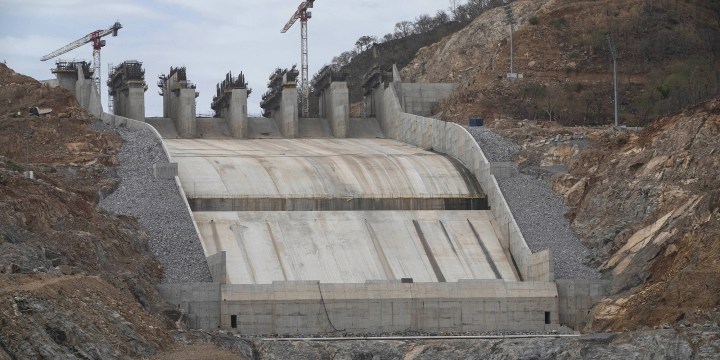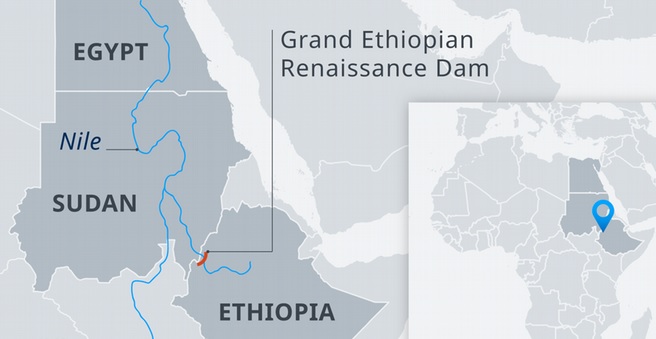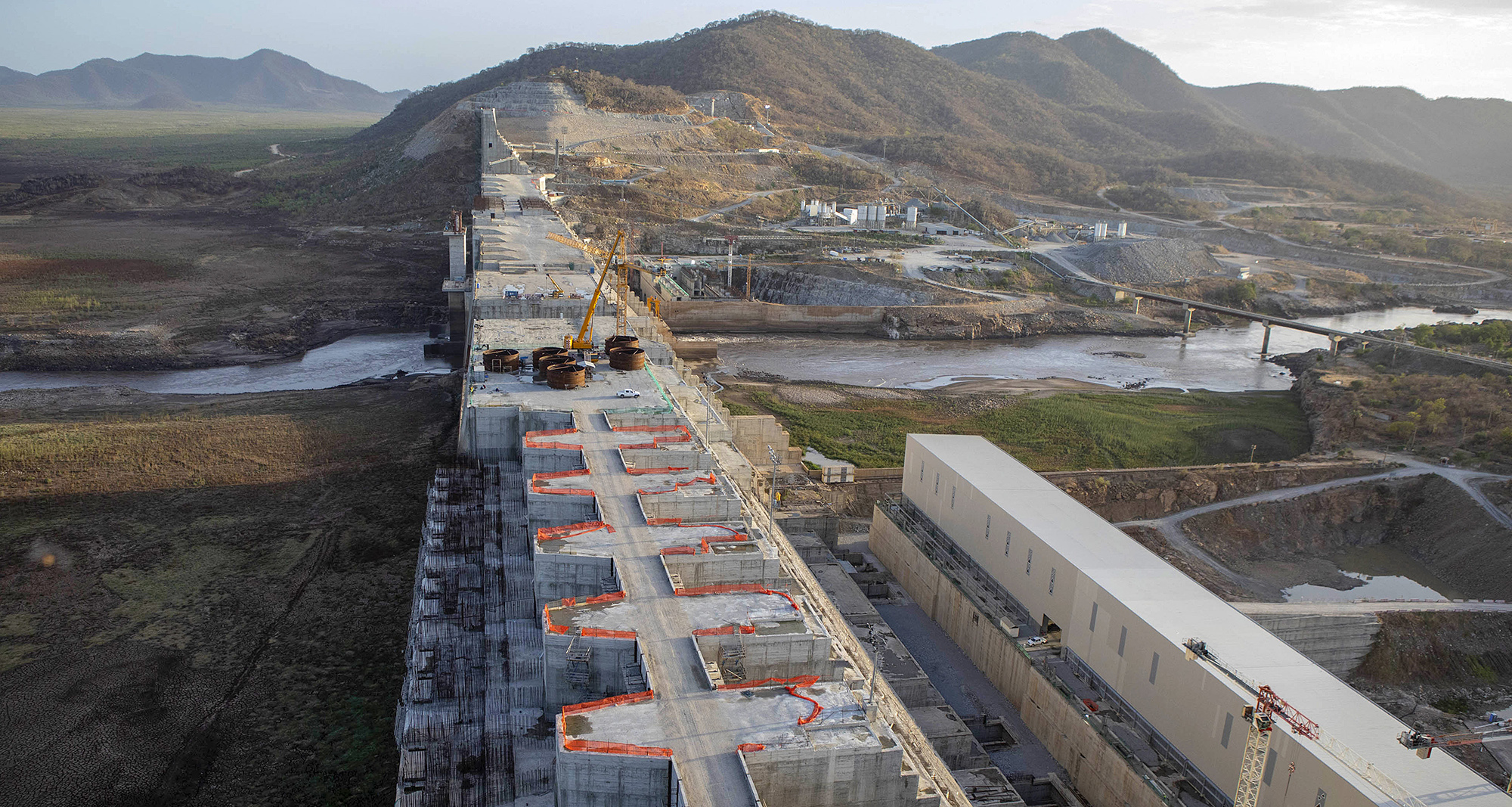OP-ED
Grand Ethiopian Renaissance Dam: Geopolitical tension escalates the potential for a war in Horn of Africa

With the recent signing of a military pact between Egypt and Sudan, rising tension between the alliance and Ethiopia risks escalating into a full-blown armed conflict. Central to the tension is Ethiopia’s damming of the Blue Nile, and territorial disputes between Ethiopia and Sudan. But regional and global geopolitics are also at play, and the AU needs to step in.
The recurrent geopolitical tensions in the Horn of Africa are underscored by the colonial or “historic” scramble for the sub-region between the colonial powers – Britain, France and Italy – and Ethiopia. The modern-day implications of that scramble have been disputes over borders, resource allocation of shared water resources and a growing migration/refugee problem owing to cultural conflicts.
Recently, the tripartite of Egypt, Ethiopia and Sudan has been at the centre of the flare-ups in the sub-region. As tension runs high between these states, the possibility of an open military standoff is imminent.
Without immediate intervention, an escalation to full-blown conflict would be to the detriment of regional peace and security both in the sub-region and in Africa at large. This would undermine/set back the African Union’s development plan embodied in Agenda 2063, and have implications on the global refugee/migration crisis. Thus, an African-led intervention (with the support of external powers where necessary) is needed to weather the impending storm.

Egypt-Ethiopia-Sudan saga
On 2 March 2021, Egypt and Sudan signed a military pact that will see improved relations across core national security lines between the two states. This agreement emerged against the backdrop of stalled dam negotiations pertaining to the filling of the Grand Ethiopian Renaissance Dam (Gerd) and border disputes between Sudan and Ethiopia. The three countries have historically disputed ownership and allocation of the water resources of the Nile River.
While Ethiopia is an upper riparian state and contributes 85% of the water in the Nile River, Egypt and Sudan are downstream states that benefit from the water contributions of their upstream counterparts.
In 2011, the former prime minister of Ethiopia, Meles Zenawi, laid the foundations for the Gerd. This has since reignited the historical transboundary water cooperation challenges in the region culminating in the military pact between Egypt and Sudan. While both countries assert that the motive for the agreement is vested in the common challenges and threats to national security, we argue that such strategically rational behaviour is not isolated, but nested in a broader geopolitical context.
The signing of the agreement took place following the high-level visit to Egyptian president Abdel Fattah El Sisi by Sudanese Foreign Minister Mariam Al Mahdi. The armed forces chiefs-of-staff of both countries, General Mohammed Farid Hegazy (Egypt) and General Mohamed Othman Al Hussein (Sudan), respectively, inked the pact in Sudan’s capital, Khartoum.
In a statement, both parties expressed gratitude for the increased security relations and cooperation between the two countries. General Hegazy stated that “Egypt is ready to meet Sudan’s request in all fields, including armament, joint training, technical support and security joint borders” alluding to the potential imminent threat looming over both countries. This statement serves as an assurance to the Sudanese but a warning to potential enemies on the availability of resources and the readiness to deploy them.
At the time of writing, Ethiopia had yet to respond to the strategic move by Egypt and Sudan.
Still, in March of 2021, Sudan accused Ethiopia of being embroiled in border-related disputes. The century-long dispute over the al-Fashqa region – where Ethiopia’s Amhara region meets Sudan’s breadbasket Gadarif state – has recently been reignited. The Anglo-Ethiopian Treaties of 1902 and 1907 allocated the land to Sudan, but Ethiopian farmers settled and tilled the farmlands over the years. Although Ethiopia was never colonised, it was subjected to colonial treaties.
In 2008, former prime minister of Ethiopia, Meles Zenawi, and the government of Sudan entered into a bilateral agreement regarding the border dispute of al-Fashqa. Ethiopia would recognise the area as part of Sudan and, in exchange, Ethiopian farmers would be allowed to continue ploughing the farmlands. This announcement became a catalyst for ethnic-driven tensions where the people of the Amhara ethnic group accused Zenawi (from the Tigray region) of selling them out by ceding land to Sudan.
Both Sudan and Ethiopia have accused each other of encroachment. In early 2021, Sudan reclaimed the al-Fashqa zone and accused Ethiopia of flying military aircraft overhead, ambushing Sudanese soldiers and killing civilians, including five women and children. Ethiopia claimed that the Sudanese military took advantage of its oversight in securing the borders to encroach and loot properties while it was addressing the Tigray conflict.
Khartoum, in turn, alleges that Addis Ababa sold arms to rebel groups to enable the destabilisation of the country, an act the Sudanese perceive as an attempt to distract from the real issues plaguing both parties and the region at large. These accusations emerge following the signing of the military pact between Egypt and Sudan in March.
Despite Sudan’s hardline stance, Ethiopia continues to maintain a diplomatic stance on the border issue but warned that patience does run out, eventually.

The flare-ups in a wider domestic and regional political context
The growing tension in the Horn of Africa specifically between the tripartite of Egypt, Ethiopia and Sudan can be situated in a broader geopolitical/regional context.
Interests, security and the Grand Ethiopian Renaissance Dam
Gerd has been a bone of contention in the region. Following Ethiopia’s unilateral decision to construct a 6,450 megawatt dam at the head of the Blue Nile, Sudan and Egypt have disputed the decision by invoking “historic” or “colonial” rights to the waterway as accorded by the 1929 and 1959 Anglo-Egyptian Treaty.
In its quest for development, Ethiopia deems electricity security as an important and integral factor for economic and human development. Downstream, Egypt and Sudan have cited the potential risk to their water security with implications for food, the environment and overall human security in their territories. Irrespective of their concerns, Ethiopia constructed the dam and the second phase of filling the dam is currently underway. This has been the source of the recent breakdown between the three countries.
Egypt and Sudan have called for a “comprehensive deal” to ensure that their interests (personified in their security concerns) are not threatened following the completion of the dam. In response, Ethiopia has rejected the call for another deal and is poised to begin the second phase, damning all consequences. Egypt and Sudan responded by signing the military pact to bolster intelligence and resource sharing between the two downstream states.

Construction machinery stands in the centre of the dam wall at the site of the under-construction Grand Ethiopian Renaissance Dam in the Benishangul-Gumuz region of Ethiopia. (Photo: Zacharias Abubeker / Bloomberg via Getty Images)
Internal political environment
The unstable internal political dynamics in both Ethiopia and Sudan are another contributing factor to the recent skirmishes. Following Abiy Ahmed’s ascension as prime minister of Ethiopia in 2018, he cultivated alliances with the disgruntled Amhara Democratic Party (ADP) while side-lining the Tigrayan People’s Liberation Front (TPLF) of which Zenawi (the prime minister who ceded al-Fashqa to the Sudanese) was a member. The Amhara ethnic group have an interest in reoccupying and claiming the al-Fashqa area.
In Sudan, the transitional government, a power-sharing agreement between the military and civilian officials has been met with disagreements and finger-pointing. Sudan has had to manage sporadic ethnic conflicts in the Port of Sudan and in the Darfur region. Internal conflicts often result in population migration to less troubled areas or neighbouring regions and refugee crises – further complicating the border disagreement between Ethiopia and Sudan. Also, historically, both countries have tribal groups speaking the same language but living on both sides of the border.
The role of external actors
The Trump administration alongside the World Bank spearheaded the mediation process between the group of three – Ethiopia, Egypt, and Sudan – from November 2019 until the mid-2020s. Failed efforts saw the relinquishing of the mantle to the then African Union Chairperson (AUC) president Cyril Ramaphosa. On 2 March 2021, the Egyptian and Sudanese foreign ministers called for an expansion of the mediation framework to include the United Nations, the US, and the European Union. Ethiopia rejected this request citing that such a gesture undermines the professed “African solutions to African problems” as put forth by Thabo Mbeki as a pan-African agenda. Also, efforts established by Cyril Ramaphosa before being succeeded by the DRC’s Félix Tshisekedi would be undermined.
While the US has a good relationship with the Egyptian government along military lines, Ethiopia has developed one of the strongest economic relationships with China on the continent. Although Egypt-US relations are underscored by tensions around human rights issues, the former perceives the US as an ally (with strong influence in international organisations such as the UN).
Ethiopia, pre-empting the dynamics of play, has insisted on the AU being the primary mediator of the negotiation processes. In the broader scheme of Agenda 2063, the AU has a bigger role to play in reaching a consensus on Gerd, however, the onus rests on Egypt to re-evaluate the premise on which it claims “acquired rights” to the water resources of the Nile Basin.
In addition, as Ethiopian and Israeli ties strengthen, Egypt has raised concerns about the implications of the relationship on the dam negotiations. Once traditional enemies who have steadily improved relations over the years, Egypt and Israel have evolved, especially across national security lines. With both countries concerned about Iran’s growing influence in the Arab region and the rise of Islamic extremism in Egypt’s Sinai Peninsula and the Palestinian Gaza Strip territory, cooperation and coordination of strategy have resulted from the shared/common threat to their national security. Where Ethiopia is concerned, Egypt argues that Israel works to serve its own interest and therefore is concerned about relations between both countries.
While both countries are yet to engage in active inter-state conflict, the onus falls on the African Union and well-meaning sub-regional organisations to curb the impending conflict.
Why it should matter to the African Union
Underpinning the establishment and transition of the Organisation of African Unity (OAU) to the African Union was the quest for an African-oriented development that is anti-colonisation, anti-imperialist and anti-imposition by externalities — a home-grown development agenda that would see the full exploitation of Africa’s potential as a strategic and global player encompasses the foundation of the institution. In charting its development trajectory, a number of treaties and agendas such as the Lagos Plan of Action, the Abuja Treaty, the New Partnership for Africa’s Development (Nepad) and now, Agenda 2063, have been ratified by all countries on the African continent.
While political will and commitment are fundamental to the successful implementation of the development agenda, peace, security and stability are of equal importance. Thus, action is required by the AU to evade interstate conflict in the region while diplomatically and peacefully urging all parties towards a lasting (re)solution. However, in the event of a full-scale war, it is important to examine the potential outcomes.
Triggering other security issues in the region
The Horn of Africa has witnessed a number of conflicts owing to border disputes between Djibouti, Eritrea, Ethiopia, Kenya, Somalia and Sudan. The implications of colonial-era treaties manifest in fiercely contested claims to territories, especially in the Horn of Africa. In 1977, Ethiopia and Somalia were embroiled in conflict over the Ogaden region and in 1998 ownership over Badme town was contested between Ethiopia and Eritrea. Following the end of the 1998 war, the Sudan-Ethiopian dispute over al-Fashqa was revived. The same effect could be replicated if the AU fails to intervene in the current dispute between the parties.
Increase the potential for small arms and light weapons dumping
Conflict/war is a catalyst for the sale and spread of small arms and light weapons (SALW). In addition to these weapons being easily accessible, portable, durable and affordable, studies show that globally they are used in killing more than 500,000 people per year. The bulk of these weapons are concentrated in Africa, thus the threat of a conflict aggravates the demand for these weapons in the region and further deaths. One of the flagships of the AU’s Agenda 2063 is “silencing the guns”. This includes ending all wars, civil conflicts, gender-based violence, violent conflicts and stopping genocide on the continent.
More than ever, the AU chairperson needs to demonstrate leadership in the Horn of Africa. A team of African mediators (with the buy-in and support of strategic international partners such as the US, China, Russia, and the United Nations) to weather the impending storm in the sub-region is imperative and urgent. DM
Dr David Monyae is the Director of the Centre for Africa-China Studies at the University of Johannesburg and Dr Ekeminiabasi Eyita-Okon is a postdoctoral research fellow at the same institute.



















In short, Ethiopia having Gerd means that Ethiopia has a stranglehold on the economies of both Egypt and Sudan.
The Ethiopian Government is based on tribal and ethnic grounds. This means confidence in the stability of Ethiopia is limited.
Do they really think the AU can resolve the impasse?